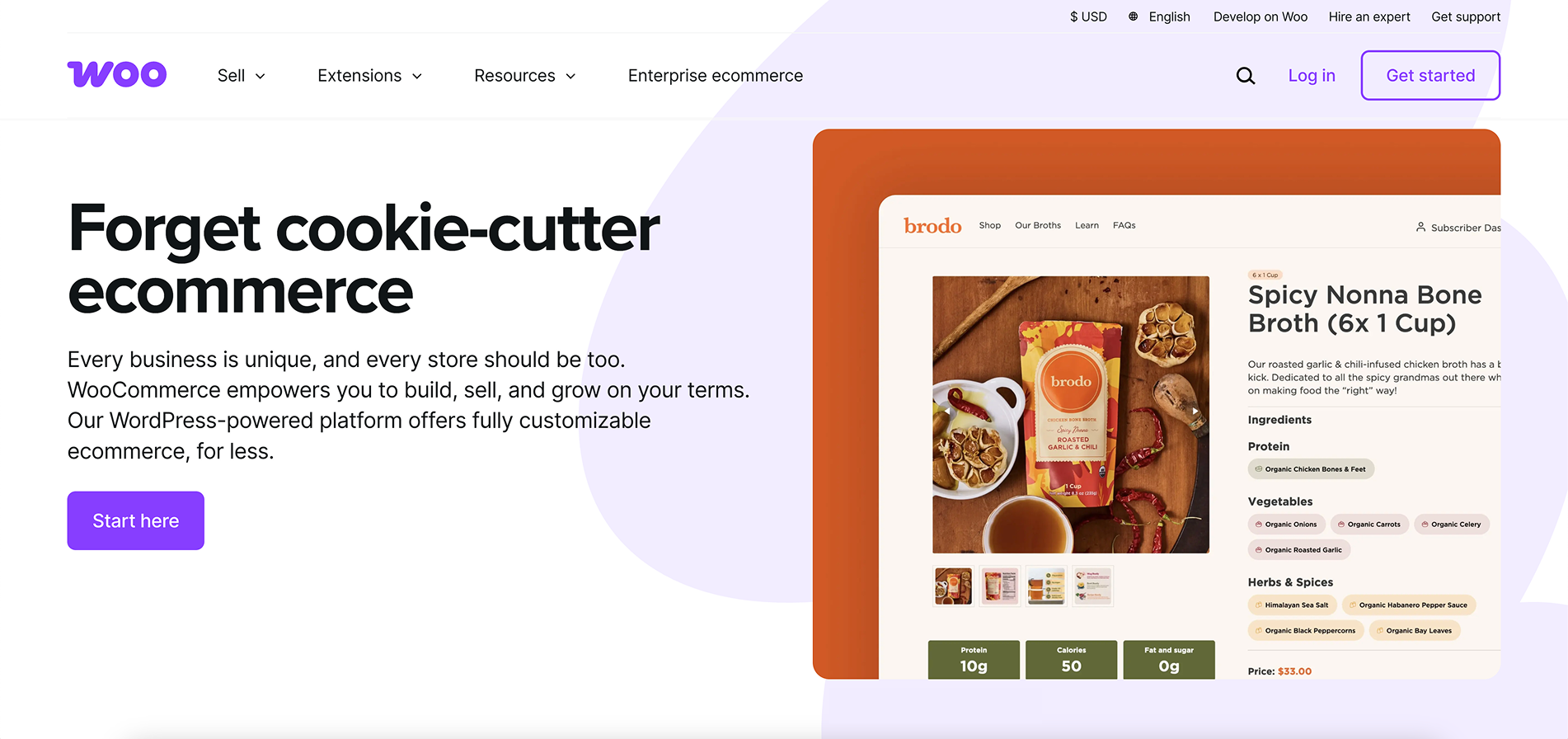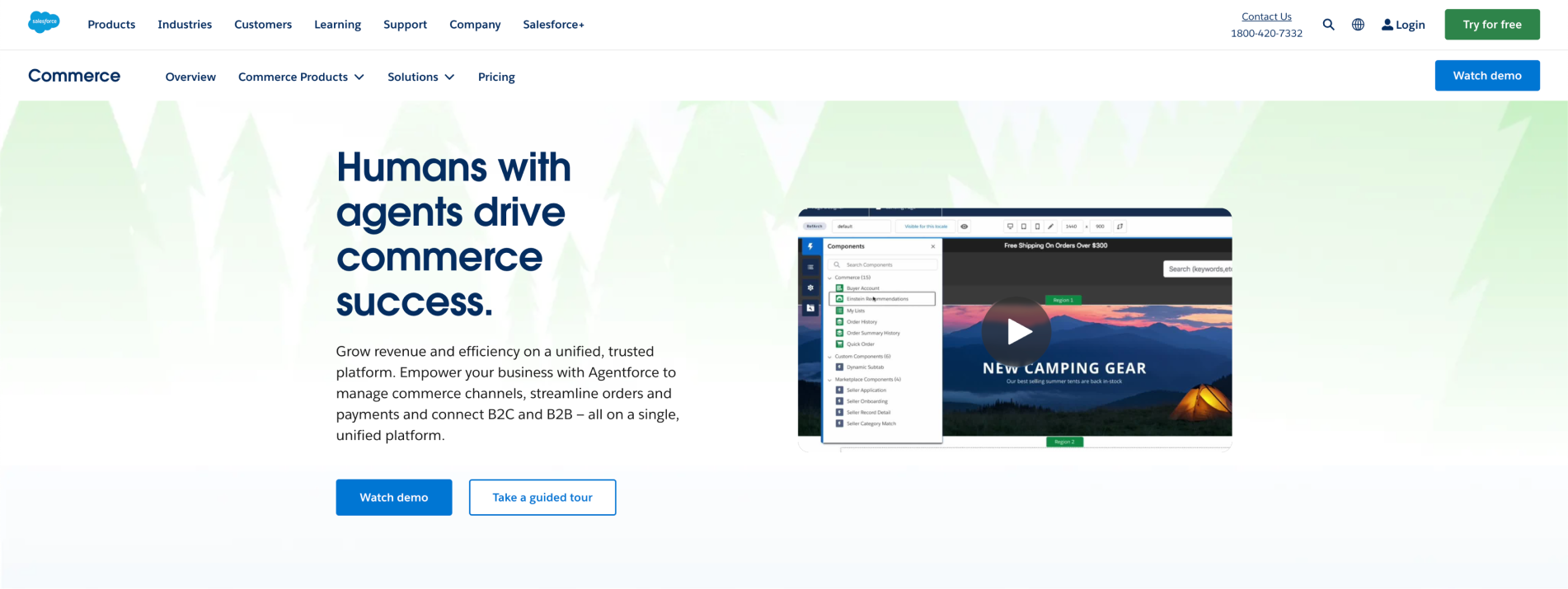Magento Alternatives: 8 Powerful Competitors for Scalable, Modern E-Commerce Solutions

Magento (Adobe Commerce) has been a leading eCommerce platform for years, with around 100,000 online stores powered by its software, and the robust tools for customization are fit for businesses with complicated stores. Magento is not just for larger businesses. It also provides a free, open-source version suitable for small to medium-sized companies. While Adobe Commerce provides a great platform for large retailers with greater needs, Magento Open Source offers smaller businesses a flexible and (in terms of functionality) powerful option. But not everyone can (or wants to) deal with Magento.
For many businesses, Magento’s steep learning curve, high development costs, and ongoing maintenance project burden have become obstacles to overcome. According to BuiltWith, the market share for Magento has been gradually diminishing. Businesses are turning to leaner and more user-friendly platforms that can lower the resource demands placed on their operation in exchange for similar capabilities.
Decision makers are turning away from Magento due to the complexities of the platform's hosting and time to market. They are on the lookout for solutions that simplify the process, speed up production, and enhance their Web experience while not losing any of the capabilities offered by Magento.
When choosing alternatives to Magento, the following are the main considerations:
- Pricing for open source or subscription.
- Ease of use: Can your non-technical team use it?
- Can you grow with the platform (scale)?
- Can you integrate the necessary third-party tools (CRM, ERP, payment gateways, etc.)?
- Level of support and community engagement.
- Marketing Functionalities.
In this article, we look for very capable Magento competitors that offer modern, scalable, and affordable eCommerce solutions, each providing unique benefits that suit modern businesses.
Factors to Consider When Selecting a Magento Alternative
When trying to move away from Magento, your business encounters a decision-making process that goes far beyond price or popularity. Choosing an eCommerce platform is a strategic move that can affect everything from your team’s overall productivity to your customer’s purchasing behavior. Below are the most important considerations to review before making the jump:
1. Business Requirements
Every business varies. Some businesses want enterprise-grade features and multiple-store capabilities. Others may want speed, ease of use, and lower operating overhead. Taking stock of your business-specific operational requirements (B2B versus B2C capabilities, internationalization, omnichannel support) will help you filter which platforms are aligned with your business direction.
2. Total Cost of Ownership
Magento can be costly, not just in licensing costs (Adobe Commerce), but also in hosting, development, ongoing maintenance costs, and software extensibility. Look at alternatives, not just by price of entry but by the total cost of ownership, including infrastructure costs, technical support, and customization.
3. Migrating Customer Data
Migrating from Magento to another platform means moving a lot of customer data, product data, orders, and URLs that are critical for SEO. The complexity of migrating data and the risks involved with data migration vary by platform. The ideal platform should offer reliable tools to ensure a smooth and secure transition, with as few data losses as possible.
4. Custom Development and Integrations
Magento typically has more customization capacity than almost all other platforms. If customization is a key requirement for your business, the new platform should offer integration options that support software flexibility, such as APIs and/or SDKs, and facilitate custom workflows. Additionally, it should seamlessly integrate with your existing tech stack, including CRM or ERP systems, marketing automation tools, payment gateways, and shipping providers, to ensure smooth operations.
5. SEO Performance
Your search engine visibility could be the difference between the success and failure of your online store. When switching platforms, it is important not to lose your existing ranking due to your changes. Make sure your platform can maintain the existing URL structure, meta tags, schema, mobile responsiveness, etc., to limit the negative impact on SEO performance after migration.
6. Downtime and Transition
When the site is down, there is lost revenue. Think through how long it will take to migrate, test, and relaunch with the new platform. Many of the alternatives offer staging environments and gradual roll-out options to minimize interruptions. Assessing vendor support in the migration phase is also critical to eliminating conflict.
7. Future Scalability
Your platform must not only support present demands but also the demands of scaling up in the future. This may include expanding your product lines, entering new markets, or preparing for a traffic rise. Make sure the option you choose supports your future growth by ensuring an ability to optimize performance, globalize, and have a flexible architecture.
A well-reasoned decision begins by assessing how the platform will support your business model and goals over its lifetime. Never seek a temporary solution for problems caused by technology limitations in Magento.
Categories of Magento Alternatives
Magento alternatives typically fall into two distinct categories: E-commerce Website Builders and open-source platforms. Each has unique advantages and disadvantages based on your business model, technical expertise, and growth strategy. Below is a concise overview of both paths to help you understand which one fits you the best.
| Type | Pros | Cons |
|---|---|---|
| 1. E-commerce Website Builders (e.g., Shopify, Wix eCommerce, BigCommerce) |
|
|
| 2. Open Source Platforms (e.g., WooCommerce, Shopware, PrestaShop) |
|
|
Website builders are most suitable for companies who prioritize speed, convenience, and support, while open source is best for teams who want total control and customization at the code level.
Best Magento Alternatives: Comparison Table
Depending on internal resources, technical expertise, and your long-term goals, the right type of Magento alternative for your team will vary.
| Platform | Architecture | Framework | Target Audience | Ease of Use | Customization | Pricing Model | SEO | Scalability | Security |
|---|---|---|---|---|---|---|---|---|---|
| WooCommerce | Modular, Monolithic | WordPress (PHP) | SMEs | Moderate | High | Free + Paid Extensions | Strong | Highly Scalable | Varies by hosting provider & setup |
| Shopify | Single codebase | Proprietary (Liquid, Ruby) | SMEs to Large Businesses | Very User-Friendly | High | Subscription | Strong | Scalable | High (PCI Compliant) |
| BigCommerce | Multi-tenant SaaS | Proprietary (SaaS, PHP) | SMEs to Large Businesses | Moderate | High | Subscription | Strong | Highly Scalable | High (PCI Compliant) |
| Salesforce Commerce Cloud | Cloud-native, Multi-tenant SaaS | Proprietary (Apex, Java) | Large Enterprises | Requires Expertise | High | Custom | Strong | Enterprise-Grade | High (PCI Compliant) |
| OpenCart | Modular monolithic | PHP / MVC | SMEs | Moderate | High | Free + Paid Extensions | Moderate | Moderately Scalable | Varies by hosting provider |
| PrestaShop | Modular monolithic | PHP / Symfony | SMEs to Mid-Sized Businesses | Moderate | High | Free + Paid Add-ons | Strong | Moderately Scalable | Varies by configuration |
| Squarespace | Closed-source, All-in-one monolithic SaaS | Proprietary (JavaScript) | Small to Medium Businesses | User-Friendly | Moderate | Subscription | Moderate | Limited Scalability | High (PCI Compliant) |
| Shopware | Headless-ready, Modular | PHP / Symfony | SMEs to Large Businesses | Moderate | High | Free (Community) / Paid | Strong | Scalable | High (Enterprise Plans) |
Best Magento Alternatives
1. WooCommerce
 WooCommerce is a powerful and flexible eCommerce plugin for WordPress, ideal for small to medium-sized businesses. It supports unlimited physical, digital, and subscription products, with built-in tools for inventory management, customizable product options, and secure customer accounts. Standout features include support for numerous payment gateways, flexible shipping options, tax automation, and deep integration with WordPress themes and plugins. Its extensible architecture and a large library of official and third-party add-ons allow full customization of storefronts, checkout flows, and marketing tools. WooCommerce is also SEO-friendly, multilingual-ready, and offers full API support for advanced integrations.
WooCommerce is a powerful and flexible eCommerce plugin for WordPress, ideal for small to medium-sized businesses. It supports unlimited physical, digital, and subscription products, with built-in tools for inventory management, customizable product options, and secure customer accounts. Standout features include support for numerous payment gateways, flexible shipping options, tax automation, and deep integration with WordPress themes and plugins. Its extensible architecture and a large library of official and third-party add-ons allow full customization of storefronts, checkout flows, and marketing tools. WooCommerce is also SEO-friendly, multilingual-ready, and offers full API support for advanced integrations.
Pros
- Fully Integrated with WordPress: Built for WordPress, it has a native integration feature allowing you to take advantage of WordPress's flexibility and ease of use.
- Customization: Because it is an open-source solution, WooCommerce offers plenty of themes, plugins, and tools that can enhance your store functionality.
- Cost-effective: The base plugin is free, and you generally pay for additional premium features (hosting, extensions).
- Community Supported: There is a huge community of developers and resources out there, along with forums.
Cons
- WordPress Knowledge Required: If you are not familiar with WordPress, you may find setup and management a little more difficult.
- Performance Issues with Growth: As your store grows, WooCommerce may require very powerful hosting and other optimizations to support larger product catalogs and high volumes of traffic.
- Limited Built-in Features: WooCommerce cannot support many of its customer-facing features without the use of 3rd party plugins. Similar to Magento, 3rd party plugins can limit compatibility during upgrades.
Thinking of launching a WooCommerce store?
Let's talkLoading...
2. Shopify

Shopify is a fully hosted eCommerce platform that provides all the essential tools to build, launch, and manage an online store. Known for its ease of use, Shopify allows businesses to get started quickly with a user-friendly interface, drag-and-drop store builder, and professionally designed themes. It supports physical and digital products, subscription sales, and multi-channel selling across platforms like Facebook, Instagram, Amazon, and more. Built-in features include secure payment processing, automated tax and shipping calculations, marketing tools, and detailed analytics. With a robust app ecosystem and scalability built in, Shopify is ideal for merchants at any stage of growth — from startups to enterprises.
Pros
- Easy to Use: Shopify is easy to set up and easy to use with a drag-and-drop interface and ready-made templates.
- All-In-One Package: You will host and securely operate Shopify at one cost, while the software will stay regularly updated.
- Great Customer Service: Offers customer service via a 24/7 support line and a wide range of online resources.
- App Marketplace: A Robust marketplace full of third-party apps for additional functionalities in your store.
Cons
- Monthly Subscription Fees: Shopify is built as a subscription service, which can be costly for smaller businesses but quickly scales.
- Less Flexible: Customizable but not as flexible for back-end customizations compared to open-source software.
- Transaction Fees: Shopify charges transaction fees that are in addition to the payment processing fees when you don’t use the payment gateway.
Looking to create a Shopify store?
Reach out to usLoading...
3. BigCommerce

BigCommerce is a cloud-based eCommerce platform built for fast-growing and enterprise-level businesses that need flexibility, performance, and scalability. It offers a robust set of built-in features, including multi-channel selling, advanced SEO tools, product filtering, and flexible shipping and tax options, right out of the box. The platform supports both B2C and B2B use cases, with native support for custom pricing, customer groups, and bulk ordering. Its open API architecture allows for headless commerce and easy integration with external systems. With no transaction fees, built-in security, and high customization potential, BigCommerce is well-suited for businesses aiming to grow without platform limitations.
Pros
- Scalability: BigCommerce can handle large traffic, as well as large product catalogs, making it an ideal platform for growing businesses.
- Built-In Features: BigCommerce provides strong built-in features, including product management, SEO tools, and analytics.
- Multi-Channel Selling: Big Commerce integrates with retail giants like Amazon, eBay, and Facebook, allowing you to sell on multiple channels.
- No Transaction Fees: BigCommerce also does not charge transaction fees, which can help businesses that are using third-party payment processing.
Cons
- Learning Curve: While BigCommerce is one of the most feature-rich platforms available, it can be overwhelming for e-commerce newbies.
- Limited Themes: While the platform does have free and paid themes available, the number of themes has its limitations compared to other eCommerce platforms, and customization can require a development team.
- Pricing Structure: BigCommerce’s pricing structure is multi-level, and businesses that may grow quickly could end up paying for top-tier plans.
Ready to scale your business with BigCommerce?
Let's talkLoading...
4. Salesforce Commerce Cloud

Salesforce Commerce Cloud is an enterprise-grade eCommerce platform designed for large-scale, high-volume businesses with complex digital commerce needs. It excels in delivering seamless omnichannel experiences, integrating online, in-store, and mobile channels through a unified platform. Built on the Salesforce ecosystem, it offers powerful tools for AI-driven personalization, customer segmentation, and automated marketing. The platform includes robust features for global commerce, multi-site management, inventory optimization, and real-time data analytics. With strong scalability, extensive customization, and deep CRM integration, Salesforce Commerce Cloud is ideal for sophisticated businesses focused on long-term digital growth and customer engagement.
Pros
- Omnichannel: This platform is known for its capability of easy integration with other Salesforce products, creating one location for customers throughout their experience.
- Highly scalable: Designed for enterprise customers, Salesforce Commerce Cloud can scale easily and deploy for a major eCommerce event or high-volume catalog.
- Advanced analytics: Advanced analytics provided by Salesforce Commerce Cloud gives you insight into your customers, AI-driven recommendations, and pass-through opportunities for them, and targeted marketing campaigns can boost sales as a result.
Cons
- A complex way to implement: Requires a dedicated team in place, as using the features, continuous updates, and customizations may require a lot of time.
- Expensive: Salesforce is a premium solution, so if it fits your business goals, expect to pay a larger (than average) cost in setting it up, and in most of the ongoing costs.
- Deeply custom: It may require advanced development skills to utilize some of the deeper customizations.
5. OpenCart
OpenCart is a free, open-source eCommerce platform known for its lightweight structure and ease of installation. Ideal for small businesses and budget-conscious merchants, it offers a straightforward way to set up and manage an online store without extensive technical knowledge. OpenCart includes essential features like multi-store support, product management, built-in payment and shipping options, and a user-friendly admin panel. It supports a wide range of extensions and themes, allowing for customization and scalability as the business grows. With a simple setup and active community support, OpenCart is a practical choice for launching and running a basic online shop.
Pros
- Free and Open Source: OpenCart is free, and many of the third-party extensions and third-party themes are free or paid.
- Easy to Get Started: OpenCart has an easy-to-use interface that allows even a non-technical user to manage their store more easily.
- Multiple Store Capabilities: OpenCart allows you to manage multiple stores from one admin panel.
- Many Active Users: OpenCart has built a strong community, mainly with many forums, tutorials, and extensive documentation.
Cons
- Limited Out-of-the-Box Features: OpenCart does well for basic eCommerce, but you'll likely need several third-party extensions to support advanced business requirements.
- Scalability Challenge: OpenCart can fit a very small business, but could be a challenge managing a very large number of products and/or a very high sales volume without a lot of customizations.
- Performance Issues: OpenCart can quickly become slow if it is not designed correctly, especially for sites with many extensions.
6. PrestaShop
PrestaShop is a flexible, open-source eCommerce platform that offers merchants full control over their online store’s features and design. It’s a strong choice for small to mid-sized businesses that want advanced functionality without the licensing costs of commercial platforms. PrestaShop includes a comprehensive set of built-in features like multilingual and multi-currency support, customizable product catalogs, SEO tools, and a modular architecture with thousands of free and paid add-ons. Its open-source nature allows for deep customization, while its active community and developer ecosystem help support ongoing growth. PrestaShop strikes a balance between cost-efficiency and professional-grade capabilities.
Pros
- Highly Customizable: Because PrestaShop is an open-source solution, it provides significant flexibility for customizing the site.
- Cost-Effective: The software is free; you just need to pay for hosting, extensions, and modules.
- Large Number of Plugins: PrestaShop has a large marketplace of add-ons to expand the capabilities of the platform.
- Multi-Lingual/Multi-Currency: Great for businesses that need to cross borders with their operations.
Cons
- Need a Development Team: Given that installation, setup, and customization may require developer resources, the talent needed may influence the cost of supporting the platform.
- Reliant on Third-Party Extensions: Like WooCommerce, PrestaShop relies heavily on 3rd party extensions, and this creates compatibility and cost of additional extensions to consider.
- Lack of Dedicated Support: Support is community-based, so resolving issues can take longer.
7. Squarespace
Squarespace is an all-in-one website builder known for its visually stunning templates and intuitive user experience. While originally focused on content-driven sites, it has evolved into a strong e-commerce option for creatives, entrepreneurs, and small businesses. Squarespace provides built-in tools for selling physical and digital products, managing inventory, and processing payments with ease. Its drag-and-drop editor, mobile-responsive designs, and integrated blogging and marketing features make it ideal for users seeking simplicity without sacrificing style. While it lacks the advanced customization of developer-heavy platforms, Squarespace is a top choice for those prioritizing design, ease of use, and quick setup.
Pros
- Beautiful modern templates that are fully responsive and very eye-catching.
- User-friendly drag-and-drop interface built for users with no coding experience.
- Built-in eCommerce options include inventory management, secure checkout, discounts, promotions, etc.
- Integrated blogging, SEO, and marketing features are perfect for content-heavy websites.
- Helpful 24/7 customer service support via live support chat and an extensive knowledge base.
Cons
- Limited flexibility with back-end customization compared to open-source or developer-friendly choices.
- Not built for bigger or more complex online stores.
- No multi-vendor marketplace option.
- Some advanced features require higher-tier paid plans (advanced analytics and promotional tools).
8. Shopware
Shopware is a modern, open-source eCommerce platform built with flexibility, scalability, and rich user experiences in mind. Shopware is designed for businesses that want to build future-ready online stores with advanced functionality. Its API-first architecture and modular design support headless commerce, seamless third-party integrations, and customized workflows. Shopware stands out for its strong content and experience management features, enabling merchants to create engaging, storytelling-driven shopping journeys. With built-in support for multi-store, multilingual, and multi-currency operations, Shopware is well-suited for businesses aiming to scale and differentiate their online presence.
Pros
- Modern tech stack (tech such as Symfony, Vue.js, etc.) that wows developers.
- Highly scalable and modular, which means it can meet the needs of Small & Medium Sized Businesses and is highly crafted for enterprise-level stores.
- Great API support is a match made for headless commerce strategies.
- The admin panel is nice and clean, where you can easily run multiple sales channels.
- Strong community and partner ecosystem of developers, made with ERG (Existence Relatedness Growth) psychological thesis partners in mind.
Cons
- Smaller community than some of the other popular platforms, such as WooCommerce or Shopify.
- Harder for a non-technical user/startup or SBM to learn/follow.
- Fees for some advanced and B2B tools and plugins (premium versions) are paywalled.
- Enterprise options may not fit small-budget businesses.
Each of these platforms features unique functionalities designed for different business models and levels of technical proficiency. Whether simplicity, flexibility, scalability, or customization, there is a Magento alternative for you.
Final Thoughts
The best Magento alternative just depends on the size of your business, your ability to navigate technology, and your unique business needs. Here is a brief overview of the best Magento alternatives and their best uses:
WooCommerce: Suitable for small to medium-sized businesses that are already using WordPress. It is affordable highly robust, and customizable, but struggles with performance as it grows.
Shopify: Great for small to medium-sized businesses who want a user-friendly, all-in-one eCommerce platform with customer support.
BigCommerce: Well-suited for enterprise businesses within the mid-to-large business category, focused on scaling. It offers built-in features and avoids transaction fees, making it attractive for growth and business opportunities.
Salesforce Commerce Cloud: Targeted towards large enterprises with an omnichannel need and high-end features with a high price point.
OpenCart: Great alternative for small businesses that are price-conscious and practical, lacking some built-in features, and struggling to scale.
PrestaShop: Good option for businesses that need highly customizable software but are cost-conscious have a significant technology overhead, and require third-party extensions.
Squarespace: Excellent for small businesses or individuals looking for an easy, all-in-one website builder that has eCommerce capabilities built in. It has gorgeous design templates, is simple to use, and all integrations are seamless, but it can be inflexible when you need advanced customization and growth at scale.
Shopware: Excellent for medium to large businesses looking for an eCommerce platform that is flexible and customizable. It's scalable, has advanced features, and integrates with complexity, but may require a higher level of technical skill to set up and manage simpler solutions.
Bottom Line
For small businesses that need a simple store, WooCommerce or Squarespace will provide reliable, cost-effective solutions. For growing businesses, Shopify, BigCommerce, or PrestaShop would make more sense because they would give more scalability for your budget, without compromising features. For large businesses, Salesforce Commerce Cloud or Shopware would be very solid, scalable options, carefully considering the investment and technical debt to deliver these solutions.
While Magento has its challenges, such as a complex installation and higher development requirements, regardless of these challenges, it is still a great platform with the right team. If you have the proper expertise, it can be used to create powerful, customized e-commerce solutions.
Webandcrafts (WAC) excels in providing quality consulting on choosing the best eCommerce platform and providing Magento development services that fit your company's unique needs. Whether you want a simple transition to a new platform or require a complex solution with customizations, you can boost your business potential with WAC.
Need to find the perfect eCommerce platform for your business?
Reach out to usLoading...
- Complete Guide to Magento (Adobe Commerce) eCommerce Platform
- Top 10 Magento Websites: Best eCommerce Websites Using Magento (Adobe Commerce)
- Adobe Commerce vs Commercetools: Choosing the Right eCommerce Platform for Scalable Success
- Magento 2 Inventory Management: Key Insights
- Magento (Adobe Commerce) vs WooCommerce: Comparison of E-commerce Platforms
Discover Digital Transformation
Please feel free to share your thoughts and we can discuss it over a cup of tea.










